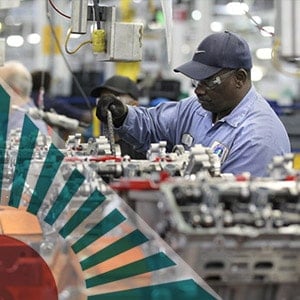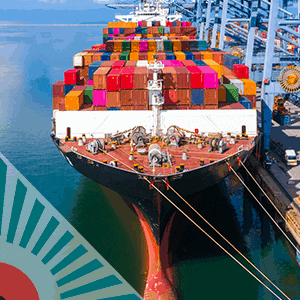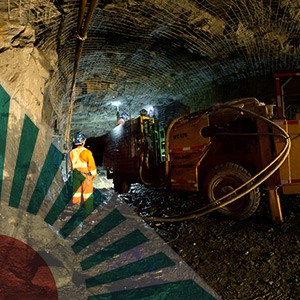Poor Manufacturing Output Reflects The Extensive Impact Of COVID-19 Pandemic On Economic Activity – SEIFSA
JOHANNESBURG, 11 AUGUST 2020 – The national lockdown occasioned by COVID-19 has had a devastating impact on manufacturing output, as reflected by negative growth rates in the volume of manufacturing production data released by Statistics South Africa (Stats SA), the Steel and Engineering Industries Federation of Southern Africa (SEIFSA) said today.
SEIFSA Chief Economist Dr Michael Ade said the data, which reflects a deceleration by -16.3% in June 2020 compared with June 2019, is worrisome for local companies in both the Metals and Engineering cluster of industries as well as the broader manufacturing sector, especially given the need for key labour-intensive sub-industries to remain resilient in order to sustain and create jobs.
“Thhe ongoing economic crisis and added pressure on the Government to address the widening current account and budget deficits mean that there will be a significant delay in the urgency with which businesses are assisted during these difficult times of the Coronavirus pandemic,” Dr Ade said.
Year on year, the latest preliminary seasonally adjusted production data captures a decrease in production in the broader manufacturing sector in June 2020 when compared to June 2019, with manufacturing output decelerating by -16.3% in June 2020. However, although a relative slowdown on a month-on-month basis, seasonally-adjusted manufacturing production increased by 16.8% in June 2020 compared with 30.4% in May 2020, highlighting continuing volatility.
Disconcertingly, the largest negative contributions of -36.6% were made by the sub-components of the Metals and Engineering Sector, comprising the basic iron and steel, non-ferrous metal products and metal products and machinery.
“The poor performance which reflects the extensive negative impact of the COVID-19 pandemic on the manufacturing sector over the months of April, May and June 2020 is cause for concern. However, the slightly-improving trend over the same months – albeit still negative – provides a degree of comfort as it means that local businesses are slowly gaining control over the challenges faced, including a disruption of supply-chain activity since the advent of the COVID-19 pandemic,” Dr Ade said.
“These are unusual times for businesses and the current economic environment, underpinned by increasing operational costs and a volatile exchange rate, has compelled businesses to be selfish in exploring ways of ensuring their survival before considering the interest of the broader industry,” he said.
Dr Ade said that despite the challenging economic atmosphere, he strongly recommends that local businesses think long term by continuously supporting other businesses where possible. He said the ongoing crisis means that much-needed assistance to improve cash flow from development finance institutions or the Government will be slow in coming.
“If local businesses cannot be assisted financially or funded, the best companies can do in the interim is to buy or source inputs locally and promote private-private partnerships,” he said.
Specifically, in times of crisis, big local or multinational businesses with the capacity and cash reserves to absorb negative shocks should assist the industry and complement ongoing long-term efforts – such as planned infrastructure spending – by the Government aimed at boosting demand and, by extension, production, he added.
“It is important to sort out demand and boost sales. Increased sales of intermediate and final manufactured products will invariably compel companies to take up more capacity as they strive to meet demand, with positive implications for manufacturing output and jobs. Importantly, increased sales will have a direct positive effect on struggling companies’ profits and margins as they strive to navigate murky waters and remain sustainable,” Dr Ade said.
SEIFSA Is “Deeply Concerned” About Eskom’s Decision To Import Designated Components
JOHANNESBURG, 10 AUGUST 2020 – The Steel and Engineering Federation of Southern Africa (SEIFSA) is deeply concerned about a decision by Eskom in the Eastern Cape to import components designated by the Department of Trade, Industry and Competition and the National Treasury for local purchase.
SEIFSA understands that Eskom has stated that the concession, which is valid from August to November 2020, is necessitated by the restrictions placed on local manufacturing and supply industries owing to the impact the COVID-19 pandemic and the associated lockdown.
SEIFSA Chief Executive Officer Kaizer Nyatsumba said Eskom’s decision is terrible for local businesses and job creation.
“The argument put forward by the utility is irrational, especially given the need for businesses, civil society, labour and government to rally behind efforts to lift the country from the current recession, which has been worsened by the COVID-19 pandemic. As a national federation of employer associations, we are deeply concerned that the latest move by Eskom is going to undo all the progress made thus far towards enhanced localisation and job creation,” Mr Nyatsumba said.
He said Eskom’s stated reason does not make sense because local manufacturers resumed some level of manufacturing activity during lockdown alert level 4 in May. He said it was clear that the electricity utility had failed to engage with manufacturers to ascertain their capacity to meet demand.
Mr Nyatsumba said Eskom’s decision to import components while there is local productive capacity is both unfortunate and misguided. He called on the company to reconsider its decision and on the Ministries of Public Enterprises, Finance as well as Trade, Industry and Competition to prevail upon the power utility to support local businesses and preserve jobs.
Mr Nyatsumba said SEIFSA has previously made several submissions to policy makers to help arrest the extent to which total domestic demand is satisfied by imports. He said it was important that designation was rigorously enforced by relevant Government agencies.
He said it was especially important, during the current economic situation facing the country, that key State-owned enterprises like Eskom play an integral role in boosting demand for intermediate manufactured products, given the extended implications in sustaining businesses and maintaining jobs.
SEIFSA WELCOMES HIGH COURT RULING IN FAVOUR OF DESIGNATION AND LOCALISATION
JOHANNESBURG, 5 AUGUST 2020 – The Steel and Engineering Industries Federation of Southern Africa (SEIFSA) has welcomed yesterday’s high court ruling in favour of the Department of Trade, Industry and Competition (DTIC) in a procurement matter, saying that it will boost struggling local businesses amid the pandemic-induced economic recession, and has lauded the DTIC for its continuous support to the local industry.
The court challenge had arisen from DTIC’s refusal to exempt a regional supplier, Continental Power Supplies (Pty) Ltd, from a localisation condition to enable imports of electrical transformers, on the basis that local capacity exists to produce the required transformers.
SEIFSA Welcomes High Court Ruling In Favour Of Designation and Localisation
JOHANNESBURG, 5 AUGUST 2020 – The Steel and Engineering Industries Federation of Southern Africa (SEIFSA) has welcomed yesterday’s high court ruling in favour of the Department of Trade, Industry and Competition (DTIC) in a procurement matter, saying that it will boost struggling local businesses amid the pandemic-induced economic recession, and has lauded the DTIC for its continuous support to the local industry.
The court challenge had arisen from DTIC’s refusal to exempt a regional supplier, Continental Power Supplies (Pty) Ltd, from a localisation condition to enable imports of electrical transformers, on the basis that local capacity exists to produce the required transformers.
Transformers and shunt reactors require a local content threshold of 90% and are among 27 important products which have been designated for local production. SEIFSA Chief Economist Michael Ade said the designation process is rigorous, involving investigations conducted by the various government departments with the local industry before a final decision is made. He said that meant that a product cannot just be designated without documented support of the existence of sufficient local productive capacity.
Dr Ade said the local manufacturing industry has made several submissions to policy makers to help arrest the extent to which total domestic demand for inputs and products in the country is satisfied by imports. He said SEIFSA believes the judgment, along with the Government’s commitment to assist struggling business, will help create an enabling environment for local businesses to increase their production output, thereby reducing the need to import goods.
“Indeed, this is not just victory for the local industry and the DTIC; it is victory for SA Inc. since, during these tough economic times when companies are low on cashflow, demand for goods is stagnant and jobs are at risk, any form of support – including a backing for local content – is welcome,” he said.
Dr Ade said the ruling that the DTIC’s procurement condition was rational, lawful, reasonable and procedurally fair gives SEIFSA hope that there is commitment across all spheres of the Government to assist local businesses, whose struggles predate the COVID-19 pandemic.
“The essence is to be inward-looking in the short term, at least for the next year or so, in order to stabilise domestic businesses through increased demand, to get the country out of the deep economic recession and to boost economic growth in the medium to long term,” Dr Ade said.
Issued by:
Mpho Lukoto
Communications Manager
Tel: (011) 298 9411 / 082 602 1725
Email: mpho@seifsa.co.za
Web: www.seifsa.co.za
Although PMI Broadly Reflects Business Optimism, Concerns Remain, Says SEIFSA
Although the composite Purchasing Managers’ Index (PMI) continued to trend in the expansionary zone, important sub-indices did not live up to expectation, the Steel and Engineering Industries Federation of Southern Africa (SEIFSA) said today.
SEIFSA Economist Marique Kruger said a dip in four out of the five sub-indices of the composite indicator does not bode well for companies in the diverse Metals and Engineering (M&E) cluster of industries, as it reflects a decrease in confidence from domestic business executives.
The performance of the PMI as the lead indicator plays a vital role in influencing how producers and relevant stakeholders in the broader manufacturing sector view the month ahead. The latest seasonally adjusted preliminary PMI data shows the composite PMI slowing from 53.9 points in June 2020, to 51.2 points in July 2020. However, it remains within the expansionary zone.
Ms Kruger said the slowdown in the composite PMI in July indicates decreased confidence by purchasing executives, who are less positive about manufacturing activity in the coming month.
“However, given the challenging economic environment, companies have to remain positive and think of innovative ways of ensuring their sustainability amid reduced spending by businesses. These may include companies broadly embracing digitisation, in line with the new normal, which can be used to place new orders and purchase stock. In addition to this, companies should embrace other cost-cutting measures like webinars and online training as a means of stabilising cash flows,” said Ms Kruger.
She said it is important for businesses to be able to register positive busiiness activities such as production/manufacturing, inventory/stock turnover, as well as delivery of raw materials and new orders in order to ensure their survival and maintain existing jobs against the backdrop of subdued economic activity.
Ms Kruger recommended that, in order to further limit unwanted consequences arising from the COVID-19 pandemic, company leaders should to review their cashflows and explore sustainable ways of reducing operational costs and the costs of sales in order to improve the bottom line and profit levels. Correspondingly, businesses should continue seeking ways to boost sales and stay relevant to the various target markets, she said.
“Such interventions will invariably contribute towards improved competitiveness and increased business activity, thereby bringing some level of normality to local M&E businesses during this period of the pandemic-induced economic crisis,” Ms Kruger said.
OPPORTUNITY! FIT PARTNERSHIP WITH GERMANY
The Department of Trade and Industry has partnered with Federal Ministry for Economic Affairs and Energy – GIZ of Germany to capacitate South African companies who wish to better understand the German market and its business culture. The initiative intend to attract companies with capacity to export from different sectors, targeting Germany as a market for their products and services. Please see the attached documents for more information.
The programme will mainly be facilitated online as a result of COVID-19 situation. The group will later visit Germany to interact with prospective German based companies when conditions permit for traveling.
Interested companies are encouraged to complete the application form for download and the following documents:
1. Proof of company registration from CIPC
2. Company brochure
3. Company Profile
Please ensure that your company is tax compliant with SARS.
The closing date for all applications is 17 August 2020, and application can be forwarded to
Phina Mashilo – pmashilo@thedtic.gov.za & Tshepo Maroga- tmaroga@thedtic.gov.za on or
before the closing date.
SEIFSA Welcomes NERSA’S Decision To Appeal High Court’s Judgement On ESKOM’S MYPD4 Application
JOHANNESBURG, 30 JULY 2020 – The Steel and Engineering Federation of Southern Africa today welcomes the decision by the National Energy Regulator of South Africa (NERSA) to appeal the high court judgment that set aside its decision on Eskom’s fourth Multi-Year Price Determination (MYPD4) for the 2019/20, 2020/21 and 2021/22 financial years.
SEIFSA Chief Executive Officer Kaizer Nyatsumba said the Federation shared NERSA’s concerns that, if left uncontested, the judgment will not only disrupt the beleaguered industry, but it will further suppress broader economic recovery, considering the current threat facing the economy.
“We believe this appeal is of utmost importance as the judgment undermines NERSA’s ability to ensure electricity consumers are not burdened by Eskom’s financial inefficiencies,” Mr Nyatsumba said.
Mr Nyatsumba said, as was articulated in a statement released yesterday, SEIFSA believes the ruling is bad news for the Metals and Engineering (M&E) sector because local companies will have to absorb additional shock in the form of increased electricity prices, at a time when the country is buckling under a struggling economy, aggravated by the negative impact of the COVID-19 pandemic.
He said with energy being an essential input to local businesses and representing a large share of the turnover of primary steel producers, any further increase in electricity costs will have a negative ripple effect on other sub-industries, further slowing down production and growth in the sector and worsening the country’s unemployment crisis.
Mr Nyatsumba said the Federation wishes the national regulator well in its appeal, with the primary objective being business sustainability and safeguarding jobs.
Drop In Factory Gate Prices Will Add To Business’s Pain In Metals And Engineering Sector
JOHANNESBURG, 30 JULY 2020 – The drop in the selling prices of domestic intermediate products will likely put a further strain on companies in the Metals and Engineering (M&E) sector, given these prices’ direct implications for the sector’s margins and profits, Steel and Engineering Industries Federation of Southern Africa (SEIFSA) Chief Economist Dr Michael Ade said today.
The producer price index (PPI) published by Statistics South Africa (Stats SA) today reflects a slowdown in selling price inflation of goods manufactured by the M&E cluster of industries for the month of June relative to May. The data shows that the annual percentage change in the PPI for intermediate manufactured goods, which is measured in factory gate prices, dipped to 1.4% in June from 1.7% May as derived demand from consumers continues to contract in a difficult economic environment.
“Decreasing consumer consumption pattern, poor domestic demand, increasing operational costs and the ongoing coronavirus pandemic are making it difficult for businesses to pass on cost increases to the market,” Dr Ade said.
Although decreasing selling prices for intermediate manufactured goods benefit consumers and buyers of inputs who can purchase more goods for the same amount of nominal income over time, the trend is worrisome mostly for selling businesses that have to absorb sudden price shocks in order to retain their clients.
Dr Ade said this is a difficult situation for businesses in the M&E sector, which are largely domestic price takers since they produce goods of an intermediate nature which are used in the production of final goods.
Dr Ade said variations in factors affecting supply, exchange-rate volatility and uncertainty from the coronavirus contagion are some of the drivers of selling price changes. Generally, a continual deterioration in selling price inflation has the potential to further dampen any existing differential between input cost inflation and selling price inflation for manufacturers, thus jeopardising their sustainability in the medium to long term, he said.
As business activity continues to slow down during these difficult times, SEIFSA recommends that stakeholders and policy makers fast-track efforts to boost infrastructure development, which is a key enabler if businesses are to expand and make a significant contribution to economic growth.
“Efforts to boost demand through increased infrastructure spending will, no doubt, exert an upward pull on selling prices as demand outstrips supply in the short term, prior to market adjustments,” Dr Ade said.
He added that the initiative will also cause a significant shift to the right, as companies use excess productive capacity to meet new domestic orders, thereby creating a significant number of part-time and full-time jobs in the process.
“Importantly, the initiatives to boost demand should be complemented by unceasing efforts to boost regional and global trade, especially given the opening up of key trading partners’ global value chains following prolonged periods of economic lockdown from the pandemic. Increased export activity will add another dimension to consumption patterns as external demand increases, also boosting local companies’ production potential,” Dr Ade concluded.
HISTORIC STANDSTILL AGREEMENT ON THE BRINK OF BEING CONCLUDED
At a meeting of the MEIBC Negotiating Committee facilitated by the CCMA today, all the trade unions reported that the SEIFSA proposal that negotiations for the current cycle be deferred and that the terms and conditions of the Main Agreement concluded between the Parties for the period 1 July 2017 to 30 June 2020 be extended until 30 June 2021 was close to being endorsed by their respective members.
Given the unprecedented socio-economic challenges brought about by the COVID-19 pandemic, the SEIFSA-affiliated Employer Organisations (representing 56% of all scheduled workers in the employ of the employer organisations on the Bargaining Council) and the sector’s five biggest trade unions (collectively representing 49,8% of all scheduled workers employed by all the Employer Organisations on the Bargaining Council) are on the brink of concluding an unprecedented stand-still agreement which will see the retention of all existing Main Agreement terms and conditions of employment and the freezing of the current wage rates until 30 June 2021.
The imminent signing of this historic standstill agreement, which will see workers not receiving an increase over the next 12 months, will be the first of its kind in traditional industry collective bargaining arrangements. When concluded, it will mark a watershed moment in business and labour coming together in recognition of an industry which finds itself in severe distress as a result of a pandemic which shows no signs of abating.
In the meantime, member companies are encouraged to continue to observe the current terms and conditions of the Main Agreement, in good faith and in accordance with sound industrial relations practice.
We will keep you informed on all developments relating to the extension of the current Main Agreement to 30 June 2021.
Kaizer M. Nyatsumba
Chief Executive Officer
COVID-19: COMPENSATION FOR WORKPLACE CONTRACTED COVID-19
On 23 July 2020, the Minister of Employment and Labour published a revised Directive for Compensation of Workplace-Acquired COVID-19 attached.
This Directive must be read with the Compensation for Occupational Injuries and Diseases Act 130 of 1993 (COIDA). COIDA provides for compensation for injuries or diseases sustained or contracted by employees in the course of their employment, or for death resulting from such injuries or diseases.
The purpose of the Directive is to clarify the Compensation Fund’s position with regards to claims for compensation by employees who have acquired COVID-19 at the workplace as result of work-related exposure/s.
Importantly, the Directive provides that a workplace-acquired COVID-19 diagnosis would depend on there being either:
- the presence of an inherent risk posed by the particular category of work or occupation (see further below); or
- exposure to a known source of COVID-19 at the workplace; or
- an approved official trip and travel history to countries and/ or areas of high risk for COVID-19 on work assignment;
AND if any of the above circumstances is present, it then also requires a reliable diagnosis of COVID-19 as per the WHO guidelines as well as a chronological sequence between exposure at the workplace and the development of symptoms.
The Directive recognizes that the Compensation Fund should consider all claims and determine whether the Fund is liable to pay compensation based on all the information that is submitted to it.
However, the Directive also provides that the inherent risk posed by various categories of work and occupations will be considered in addition to an employee’s exposure and clinical history.
In this regard, the Directive makes provision for four levels of risk posed by various categories of work and occupations – the higher the risk, the more likely that the virus was contracted in the course and scope of employment.
These occupational risk levels are as follows:
- Very high exposure risk occupations, being those with high potential for exposure to known or suspected sources of COVID-19 during specific medical, post mortem or laboratory procedures, including healthcare employees, morgue employees and laboratory employees who come into contact with confirmed positive COVID-19 cases or specimens;
- High exposure risk occupations, being those with high potential of exposure to known or suspected patients with COVID-19, including healthcare delivery and support employees, medical transport employees moving patients, and mortuary employees involved in preparing bodies for burial or cremation;
- Medium exposure risk occupations, being those that require frequent and/or close contract (within 1.5 metres) with people who may be infected with COVID-19, but who are not known or suspected COVID-19 patients, such as employees employed in schools, and high-population-density work environments such as labour centres, consulting rooms, point of entry personnel and some high-volume retail settings; and
- Low risk occupations, being those that do not require contact with people known to be or suspected of being infected with COVID-19, nor frequent close contract (within 1.5 metres) with the general public. Employees in this category have minimal occupational contact with the public and other fellow employees.
The Directive further sets out the benefits available to persons who are temporarily or permanently disabled due to infection with COVID-19.
Importantly, the Compensation Fund will not provide compensation for unconfirmed cases which are still being investigated. Accordingly, where an employee self-isolates or self-quarantines, the employer should deal with the employee’s absence in line with the Consolidated COVID-19 Directive on Health and Safety in the Workplace.
In the event that an employer becomes aware than an employee has contracted COVID-19 or is suspected of having contracted COVID-19 as a result of a work-related exposure, it would do well to have regard to this Directive (read with the COIDA) without delay. The Directive explains how reporting must be done and what information and documents will be required to be submitted.







